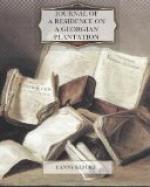On Sunday, I rode to a place called Frederica to call on a Mrs. A——, who came to see me some time ago. I rode straight through the island by the main road that leads to the little church.
How can I describe to you the exquisite spring beauty that is now adorning these woods, the variety of the fresh new-born foliage, the fragrance of the sweet wild perfumes that fill the air? Honeysuckles twine round every tree; the ground is covered with a low white-blossomed shrub more fragrant than lilies of the valley. The accacuas are swinging their silver censers under the green roof of these wood temples; every stump is like a classical altar to the sylvan gods, garlanded with flowers; every post, or stick, or slight stem, like a Bacchante’s thyrsus, twined with wreaths of ivy and wild vine, waving in the tepid wind. Beautiful butterflies flicker like flying flowers among the bushes, and gorgeous birds, like winged jewels, dart from the boughs,—and—and—a huge ground snake slid like a dark ribbon, across the path while I was stopping to enjoy all this deliciousness, and so I became less enthusiastic, and cantered on past the little deserted churchyard, with the new-made grave beneath its grove of noble oaks, and a little farther on reached Mrs. A——’s cottage, half hidden in the midst of ruins and roses.
This Frederica is a very strange place; it was once a town, the town, the metropolis of the island. The English, when they landed on the coast of Georgia in the war, destroyed this tiny place, and it has never been built up again. Mrs. A——’s, and one other house, are the only dwellings that remain in this curious wilderness of dismantled crumbling grey walls compassionately cloaked with a thousand profuse and graceful creepers. These are the only ruins properly so called, except those of Fort Putnam, that I have ever seen in this land of contemptuous youth. I hailed these picturesque groups and masses with the feelings of a European, to whom ruins are like a sort of relations. In my country, ruins are like a minor chord in music, here they are like a discord; they are not the relics of time, but the results of violence; they recall no valuable memories of a remote past, and are mere encumbrances to the busy present. Evidently they are out of place in America, except on St. Simon’s Island, between this savage selvage of civilisation and the great Atlantic deep. These heaps of rubbish and roses would have made the fortune of a sketcher; but I imagine the snakes have it all to themselves here, and are undisturbed by camp stools, white umbrellas, and ejaculatory young ladies.




